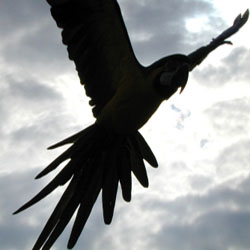Recovering a Lost Bird
 There may come an unfortunate time when your parrot companion is lost or stolen. There are several steps you can take to prevent theft or loss.
There may come an unfortunate time when your parrot companion is lost or stolen. There are several steps you can take to prevent theft or loss.
Be Prepared
If your bird is stolen or flies away, every minute is of the essence and even a few minutes might make the difference in whether your bird is recovered. Taking steps to prepare for this type of occurrence will help you react more quickly and will also help you be prepared to react in the event of manmade or natural disaster.
- Keep proof of ownership records.
- Make a record of your bird's leg band ID.
- Have several recent color photos of your bird on hand.
- Have a digital photo ready to go for a lost bird flyer, or even better...
- Draft a flyer complete with a photo on your computer containing all your pertinent contact information that can be quickly updated with last minute specifics regarding the loss (date, location, etc).
- Microchip your bird for ID purposes. This is a small device inserted under the skin. A scanner can then be used to retrieve your bird’s information.
Loss Prevention
The following simple preventative measures will go a long way towards preventing your bird from flying away:
- Keep your birds wings clipped. Be especially vigilant in the summer months when doors and windows are often open.
- Don't assume your bird won't take off. Even a bird who is content to remain on your shoulder 24/7 will take off if startled by a loud noise or a dog jumping up at them.
- When you take your bird outside, always keep them in a carrier or wearing a flight suit/harness.
- Make sure your birds outside cage or aviary has secure locks.
- Teach your bird your address and phone number.
Theft Prevention
The states with the highest rates of bird theft are Florida and California. Large parrots are the birds most often targeted. The following tips will help you avoid being victimized by a potential bird thief:
- Keep birds out of windows that can be viewed and easily accessed by the public.
- Should you take your bird out in public, beware that someone might follow you home.
- Don't give out personal information or your phone number to strangers who know you have exotic birds.
- Don’t discuss your home security with anyone.
- Put motion detector lights outside your home.
- Keep your windows and doors locked.
If Your Bird is Lost or Stolen
Domestically raised parrots typically don't have the requisite skills to survive for long periods in the wild. However, depending on the climate, availability of food (fruit trees, vegetable gardens, bird feeders) and the level of exposure to predators they have been known to survive several days to years.
There are several steps you can take to increase the likelihood of recovering your bird:
- Place a cage with food and water on the roof or in a tree.
- Tell everyone in your neighborhood and enlist help in spotting your bird, making phone calls and distributing posters.
- Notify the following organizations as soon as possible:
- Police
- Animal Control
- Humane Society
- Vet Clinics
- Pet Stores
- Local bird clubs
- Rescue Organizations
- Make and place brightly colored posters in the following locations:
- around your neighborhood
- grocery stores
- pet stores
- schools
- churches
- libraries
- Place ads in your local newspapers
- Watch the ads in the local paper to see if someone has found or may be trying to sell your bird.
- Place listings on websites dedicated to recovering lost pets:
- Birds are most vocal just before sunrise and just after sundown so these are especially good search times.
- Make familiar calls to your bird and listen for a response.
- If your bird is spotted in a tree, enlist help in keeping a watch on him until you can effect a rescue.
- Don't give up!







Comments powered by CComment